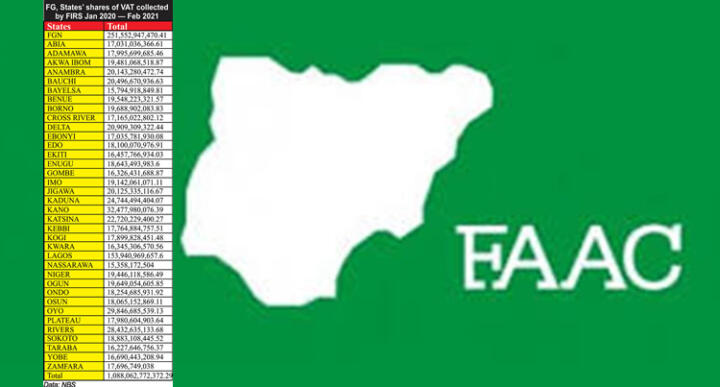The Federation Account Allocation Committee (FAAC) has announced plans to recover ₦101 billion from the Nigerian Customs Service after an internal audit report revealed discrepancies and under-remittance of funds meant for allocation across federal, state, and local governments.
According to sources within the revenue distribution mechanism, the audit uncovered that Customs collected this amount but failed to forward it to the federation account over an extended period. The shortfall was detected during a routine financial review preceding FAAC’s most recent disbursement meeting, sparking concerns about transparency and accountability in revenue collection.

Officials said the audit, conducted jointly by the Ministry of Finance’s audit team and representatives from the FAAC secretariat, examined Customs’ monthly remittances and reconciled them against bank statements and operational receipts. The results indicated a cumulative gap that prompted immediate deliberation. FAAC members debated whether the amount arose from delayed transfers, procedural lapses, or internal withholding by Customs authorities.
At the meeting where decisions were made, federal, state, and local government representatives unanimously supported a resolution to instruct Customs to remit the outstanding amount in full before the next monthly FAAC allocation. Failure to comply, they noted, could result in exclusion from subsequent federal disbursements or administrative sanctions.
A key concern raised by state government delegates was the precedent such non-remittance sets, eroding confidence in the integrity of Nigeria’s fiscal federalism structure. They urged stronger oversight mechanisms to prevent repetition, warning that any delay could impact downstream allocations for critical services and capital projects in their constituencies.
FAAC’s directive includes a clear deadline: Customs is to settle the ₦101 billion debt within 30 days. Officials also confirmed that going forward, enhanced reconciliation protocols and real-time tracking of revenue from collection to allocation will be instituted to ensure accountability at every level.
Customs leadership has acknowledged receipt of the directive and reportedly committed to cooperating fully. In a statement issued soon after the FAAC meeting, the Comptroller-General of Customs assured that the discrepancy would be rectified immediately. He emphasized that the failure to remit was an unintended error in administrative procedures, not deliberate concealment.
The Customs Service indicated plans to deploy internal audit teams and engage relevant departments to trace the origin of the shortfall, while also implementing corrective measures to prevent future occurrences. They pledged a full report to the Ministry of Finance and FAAC at the point of reconciliation.
Revenue analysts welcomed the FAAC’s firm response, saying it sends a message that fiscal discipline will not be compromised. According to fiscal strategy experts, ensuring timely and accurate remittances protects the credibility of the federation account system and promotes investor and citizen trust in public finance management.
Civil society organisations also applauded the move, calling it a victory for transparency. Representatives from budget advocacy groups noted that past experiences have shown that delayed or diverted revenues contribute to budget gaps in states, often disrupting payments for teachers, healthcare workers, and public infrastructure.
Some stakeholders, however, cautioned that administrative reforms alone may not guarantee sustained compliance. They recommended statutory amendments that strengthen the supervisory role of FAAC and empower it to impose penalties or demand public explanations in cases of revenue leakage.
From a fiscal impact perspective, the ₦101 billion recovery is significant—comprising a sizable portion of FAAC’s average monthly allocation pool. It will boost liquidity for subnational governments and could ease near-term pressure on local budgets, especially as many states grapple with revenue shortfalls and rising expenditure needs.
Federal representatives reminded delegates of the importance of maintaining the credibility of Nigeria’s revenue-sharing framework, stressing that all revenue-collecting agencies must adhere strictly to established protocols. They affirmed that FAAC would deploy additional audit resources and enhance its engagement with relevant agencies to forestall similar disruptions in the future.
Economists observed that while applied annually, leaks of this magnitude contribute to inefficiency and undermine the developmental impact of public funds. Recovering the amount—and ensuring proper remittance—is crucial for maintaining equity among states and avoiding unintended fiscal fragility.
While Customs agents reportedly earn commission and allowances based on performance, the incident underscores the need for better monitoring of revenue declarations and tighter alignment between collection points and FAAC databases. Improved automation and inter-agency data sharing are likely outcomes of forthcoming reforms.
By directing Customs to deliver the ₦101 billion owed, FAAC is sending a clear signal that accountability will be enforced. The agency’s approach may also serve as a blueprint for handling possible discrepancies in allocations arising from other revenue-generating bodies such as the Federal Inland Revenue Service (FIRS), Nigerian National Petroleum Company (NNPC), and agencies collecting excises or stamp duties.
As the 30-day clock starts ticking for Customs to make payment, state governors and local government officials are expected to monitor compliance closely. Should the agency fall short, federal oversight may step in urgently to safeguard the distribution process.
In conclusion, FAAC’s decision to recover ₦101 billion from Customs and introduce tighter reconciliation measures reflects a renewed commitment to strengthening fiscal transparency and ensuring timely revenue flows. If effectively implemented, the approach could bolster confidence in Nigeria’s revenue-sharing system and improve delivery of public services across all levels of government.
Support InfoStride News' Credible Journalism: Only credible journalism can guarantee a fair, accountable and transparent society, including democracy and government. It involves a lot of efforts and money. We need your support. Click here to Donate
